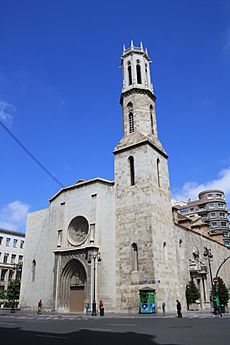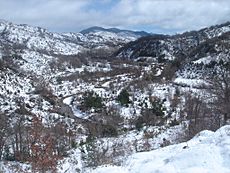Bernat Oliver facts for kids
Bernat Oliver (died 14 July 1348), also known as Bernardo Oliver, was an important religious leader, a skilled negotiator, and a bishop from Valencia.
He joined the Augustinian Order, a religious group, before 1310. He studied theology and philosophy in Paris, then became a professor in his home city of Valencia in 1320. By 1329, he was a senior leader among the Augustinians in the Crown of Aragon. Around this time, he started working as a diplomat for the kings of Aragon, traveling to the Pope's court and to France. He also served several popes as a diplomat, spending a lot of time in Avignon, where the popes lived then. In 1337, he became the bishop of Huesca. He was later moved to lead the church in Barcelona in 1345, and then to Tortosa in 1346. Although he was suggested for a very high position called a cardinal, he never received it. Sadly, he died from the Black Death, a terrible disease, in 1348.
Oliver wrote many books and papers. Some of his sermons and documents from his time as a bishop still exist. His religious writings covered topics like the Bible and church laws. He is best known for his book Excitatorium mentis ad Deum, which was an important work on Augustinian mysticism, a special way of thinking about God, in Spain.
Contents
Life Story
Becoming a Leader and Diplomat
Bernat Oliver was born in the late 1200s to an important family in Valencia. His parents made sure he received a good education in grammar and Latin. Before 1310, he joined the Augustinians at the Church of Saint Augustine in Valencia. He then went to the University of Paris to study theology and philosophy, where he earned his doctorate and became a teacher.
Oliver returned to Valencia around 1320. He got a teaching job at the local studium, which was an early form of the University of Valencia. In 1320, he became the leader (Prior) of the Augustinians in Valencia. He was promoted several times, becoming the top leader (Provincial superior) of the Augustinian province of Aragon on 7 October 1329.
In the early 1330s, Oliver began working for the King of Aragon, Alfonso IV. He served as the king's special messenger to Pope John XXII. Since the Pope was living in Avignon at that time, Oliver spent several years there. He gave sermons to the Pope and his cardinals in 1331 and 1334. He was also one of the religious experts asked to study the Pope's ideas about the Beatific Vision in 1333 and 1336.
Bishop of Huesca
On 1 October 1337, Pope Benedict XII chose Bernat Oliver to be the bishop of Huesca and Jaca. He was the first Augustinian to become a bishop in Spain. In September 1340, Oliver visited the cathedral in Jaca to set up rules for its management. After that, he held a special meeting for the church leaders in Huesca.
In July 1341, King Peter IV of Aragon sent Oliver to talk with King James III of Majorca and his friend, King Philip VI of France. His mission was to prevent a war between Aragon and Majorca. He returned to Spain in April 1342 to attend a church meeting in Zaragoza. At this meeting, he brought up a disagreement about the Onsella valley, which belonged to Huesca but was controlled by the church in Pamplona. He went back to Avignon in 1343, but Pope Clement VI sent him back to King Peter IV on another diplomatic mission. In 1345, King Peter IV asked the Pope to make Oliver a cardinal because of his efforts to bring peace. However, this did not happen. King Peter IV later wrote in his Chronicle that Oliver was "one of the greatest masters of theology then in the world."
Leading in Barcelona and Tortosa
On 12 January 1345, while Oliver was in Avignon, Pope Clement moved him from Huesca to lead the church in Barcelona. Oliver was still in Avignon on 21 March, where he gave a sermon to the Pope. He sent a representative to take charge of the church in Barcelona for him. He finally arrived in Barcelona himself on 16 June. The next day, he promised to follow the church's rules. In July, he helped solve some disagreements at a Franciscan religious house in Vilafranca del Penedès. On 19 August 1345, he held a special meeting for the church leaders in his area and created new rules. His time in Barcelona was short. On 26 June 1346, the Pope moved him again, this time to Tortosa.
Oliver arrived in Tortosa on 12 August 1346. On 21 May 1347, he helped lay the first stone for the new Tortosa Cathedral. On 28 May, working with the church leaders, he created new rules for the church in Tortosa, focusing on helping the people.
In early 1348, the government of Catalonia sent him to negotiate between different groups to prevent a civil war in the Crown of Aragon. On his way back, he became sick with the bubonic plague. He died on 14 July 1348, a victim of the Black Death. He was buried in the chapel of Saint Candida in the Tortosa Cathedral.
His Writings
Bernat Oliver wrote in Latin. While in Paris in 1317, he wrote Tractatus contra caecitatem iudeorum. This book was meant to help teach about different religious views. It used strong arguments and quotes from the Bible and other thinkers. It was one of his most popular works, and many copies still exist today.
During his time as a professor in Valencia in the 1320s, Oliver wrote a four-book commentary on the Sentences, a famous theological text. His most well-known work is Excitatorium mentis ad Deum, which is about Christian mysticism. This book was inspired by the Confessions of Augustine of Hippo and was very different from his other academic writings. It was translated into Catalan before 1417. The original Latin, the Catalan translation, and a modern Spanish translation have all been published.
Besides the three sermons that have been saved, Oliver wrote several other religious and Biblical books and papers. Many of these have not yet been published:
- Contra perfidiam Iudeorum
- Super caput cum Marthe de celebratione missarum
- Quaestiones quodlibetales
- De divinis officiis
- Diatriba contra iudeos
- Contiones ad populum valentinum
- Speculum animae
- Tractatus contra antichristum
- Tractatus de inquisitione Antichristi (the author of this work is not certain)
- Concordantiae decretorum cum Biblia (a book that connects church laws with Bible passages)
- Expositio Canonis Missae
- Expositio in capitulum cum Marthae de celebratione Missarum
- Sermo qui legit, intellegat
- Espertamiento de la voluntad de Dios (a text that only exists in a Spanish translation)
See also
 In Spanish: Bernat Oliver para niños
In Spanish: Bernat Oliver para niños
 | Dorothy Vaughan |
 | Charles Henry Turner |
 | Hildrus Poindexter |
 | Henry Cecil McBay |



